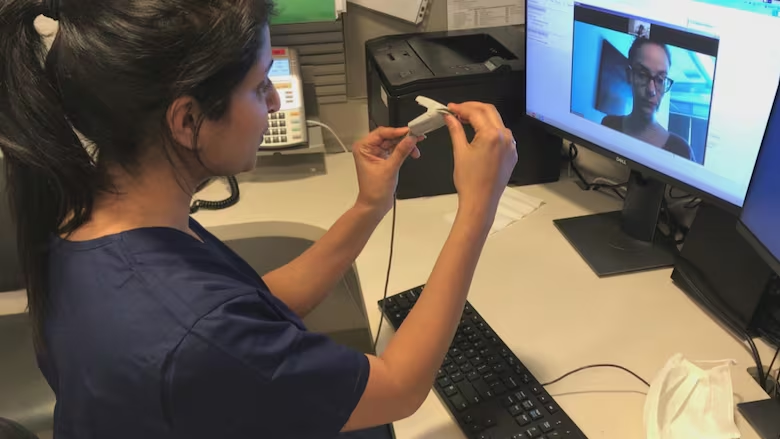Virtual visits with Ontario family doctors to remain the norm, for now
Ontario Medical Association urging province to cover extra costs of PPE to enable more in-person visits

While Ontario's Stage 3 reopening means people can go to bars and eat in restaurants, family physicians are unlikely to transition from virtual to in-person visits any time soon, despite concerns over potential long-term consequences.
"Until it is feasible for doctors to protect their communities, they are not going to change that practice," said Dr. Samantha Hill, president of the Ontario Medical Association (OMA).
The OMA found in June, two-thirds of doctors were delivering most patient care via telephone or virtually.
Hill said the exponential rise in costs for both personal protective equipment (PPE) and investments needed to make doctors' offices COVID-safe, is largely behind a slow transition back to in-person visits.
"The last thing any physician wants is to be the source of a community spread event," said Hill.
"So if we aren't able to protect our staff and ourselves and our patients from each other, then we don't reopen — it's just as simple as that."
Soaring costs of PPE
Ottawa physician Dr. Aly Abdulla, chair of general and family practice at the OMA, said he estimates a medical clinic would need between $4,000 and $5,000 to bring it in line with the infrastructure guidelines around physical distancing.
The other issue is PPE where "most doctors have enough to get them to 10 a.m.," he said.

Abdulla is seeing about one in five patients in person, but that has increased his PPE costs from $200 a year to $200 a month, he said.
"I used to get one of those basic masks for 15 cents each," said Abdulla, "Now I pay a $1 for each mask. That's not a 10 or 15 per cent increase. That's a multiple of increases."
The full gowns needed for higher risk procedures that used to cost $1 each, are now $7, he said. A medical grade face shield can cost up to $400.
Hill is urging the Health Ministry to consider boosting investment in family doctors or suffer the long-term consequences of online-only visits.
"As we cut off a lot of the preventative care — things like colonoscopies or pap smears or mammograms — we miss things that can be caught early and when we miss things that can be caught early, they present late. And that's not good for the economy [and] that's not good for the patients."
The Ministry of Health was not able to respond to our questions in time for publication.
Patient conflicted
Patient Charlie Courneyea says he's unsure about going in to see his own doctor.
He is anxious about the delay in screening by his doctor for skin cancer — which he is supposed to get each year after surviving cancer on his leg. On the other hand, the Oshawa resident is torn about the risk associated with in-person visits.
"We've all heard the stories of long-term care and there's not enough PPE for everybody," said Courneyea, "If I'm not going to die, then I can wait."
Natalie Mehra, executive director of the Ontario Health Coalition, wants the province to consider the long-term health costs of leaving doctors without adequate tools to reopen.
The coalition wants the government to create a secure, affordable supply of PPE for all health-care providers before a possible second wave of the pandemic.
"There is a real human and financial cost to all this delayed care and treatment and it would behove us now to get people in as quickly as possible," she said in an email.
Abdulla flags that in-person care is available at special clinics and the hospital when a doctor feels a virtual visit is not enough.
At the same time, he said virtual appointments are a safe and effective form of care that many patients, particularly seniors and people with mobility problems or compromised immune systems, have welcomed during the pandemic.
